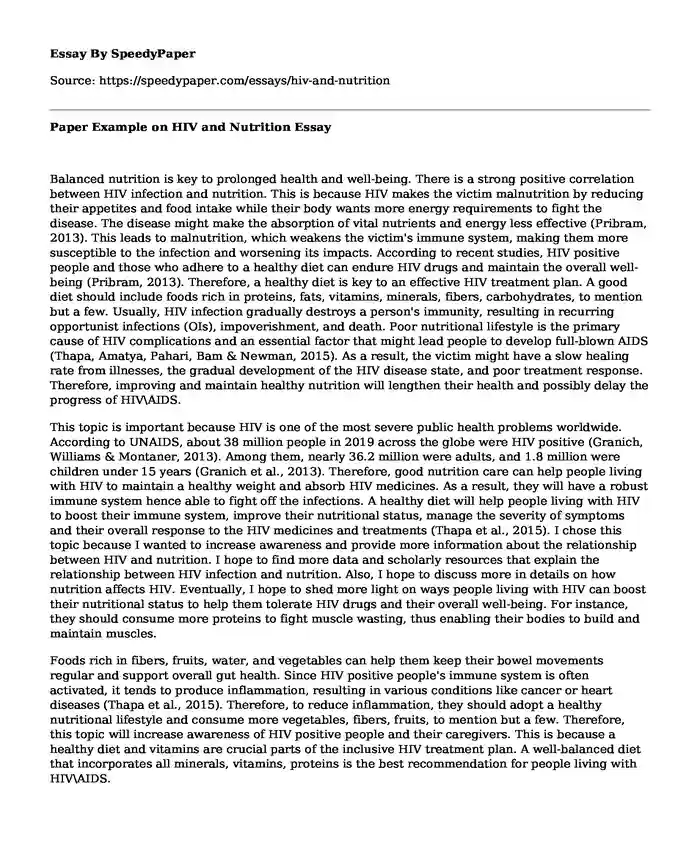Balanced nutrition is key to prolonged health and well-being. There is a strong positive correlation between HIV infection and nutrition. This is because HIV makes the victim malnutrition by reducing their appetites and food intake while their body wants more energy requirements to fight the disease. The disease might make the absorption of vital nutrients and energy less effective (Pribram, 2013). This leads to malnutrition, which weakens the victim's immune system, making them more susceptible to the infection and worsening its impacts. According to recent studies, HIV positive people and those who adhere to a healthy diet can endure HIV drugs and maintain the overall well-being (Pribram, 2013). Therefore, a healthy diet is key to an effective HIV treatment plan. A good diet should include foods rich in proteins, fats, vitamins, minerals, fibers, carbohydrates, to mention but a few. Usually, HIV infection gradually destroys a person's immunity, resulting in recurring opportunist infections (OIs), impoverishment, and death. Poor nutritional lifestyle is the primary cause of HIV complications and an essential factor that might lead people to develop full-blown AIDS (Thapa, Amatya, Pahari, Bam & Newman, 2015). As a result, the victim might have a slow healing rate from illnesses, the gradual development of the HIV disease state, and poor treatment response. Therefore, improving and maintain healthy nutrition will lengthen their health and possibly delay the progress of HIV\AIDS.
This topic is important because HIV is one of the most severe public health problems worldwide. According to UNAIDS, about 38 million people in 2019 across the globe were HIV positive (Granich, Williams & Montaner, 2013). Among them, nearly 36.2 million were adults, and 1.8 million were children under 15 years (Granich et al., 2013). Therefore, good nutrition care can help people living with HIV to maintain a healthy weight and absorb HIV medicines. As a result, they will have a robust immune system hence able to fight off the infections. A healthy diet will help people living with HIV to boost their immune system, improve their nutritional status, manage the severity of symptoms and their overall response to the HIV medicines and treatments (Thapa et al., 2015). I chose this topic because I wanted to increase awareness and provide more information about the relationship between HIV and nutrition. I hope to find more data and scholarly resources that explain the relationship between HIV infection and nutrition. Also, I hope to discuss more in details on how nutrition affects HIV. Eventually, I hope to shed more light on ways people living with HIV can boost their nutritional status to help them tolerate HIV drugs and their overall well-being. For instance, they should consume more proteins to fight muscle wasting, thus enabling their bodies to build and maintain muscles.
Foods rich in fibers, fruits, water, and vegetables can help them keep their bowel movements regular and support overall gut health. Since HIV positive people's immune system is often activated, it tends to produce inflammation, resulting in various conditions like cancer or heart diseases (Thapa et al., 2015). Therefore, to reduce inflammation, they should adopt a healthy nutritional lifestyle and consume more vegetables, fibers, fruits, to mention but a few. Therefore, this topic will increase awareness of HIV positive people and their caregivers. This is because a healthy diet and vitamins are crucial parts of the inclusive HIV treatment plan. A well-balanced diet that incorporates all minerals, vitamins, proteins is the best recommendation for people living with HIV\AIDS.
References
Granich, R., Williams, B., & Montaner, J. (2013). Fifteen million people on antiretroviral treatment by 2015. Current Opinion in HIV and AIDS, 8(1), 41-49. https://doi.org/10.1097/coh.0b013e32835b80dd
Pribram, V. (2013). Introduction to nutrition and HIV. Nutrition and HIV, 18-31. https://doi.org/10.1002/9781118786529.ch2
Thapa, R., Amatya, A., Pahari, D. P., Bam, K., & Newman, M. S. (2015). Nutritional status and its association with quality of life among people living with HIV attending public antiretroviral therapy sites of Kathmandu Valley, Nepal. AIDS research and therapy, 12(1), 14.
Cite this page
Paper Example on HIV and Nutrition. (2023, Dec 26). Retrieved from https://speedypaper.com/essays/hiv-and-nutrition
Request Removal
If you are the original author of this essay and no longer wish to have it published on the SpeedyPaper website, please click below to request its removal:
- Abortion for Genetic Defects, Essay Example
- Essay Example on Overall Wellness
- Healthcare Essay Sample: Saving Mothers in Sri Lanka
- Medical Essay Example: Post-Operative Complication
- Paper Example. Psychiatric Community
- Ethical Priority-Setting in Healthcare during Pandemics: A Comprehensive Analysis and Policy Proposal - Free Essay
- Free Report on Pandemic Pet Care: Navigating Challenges with Innovative Services
Popular categories





